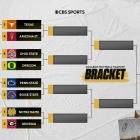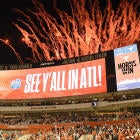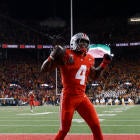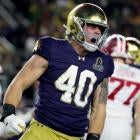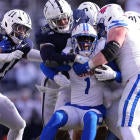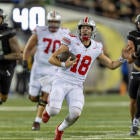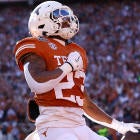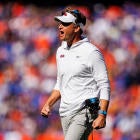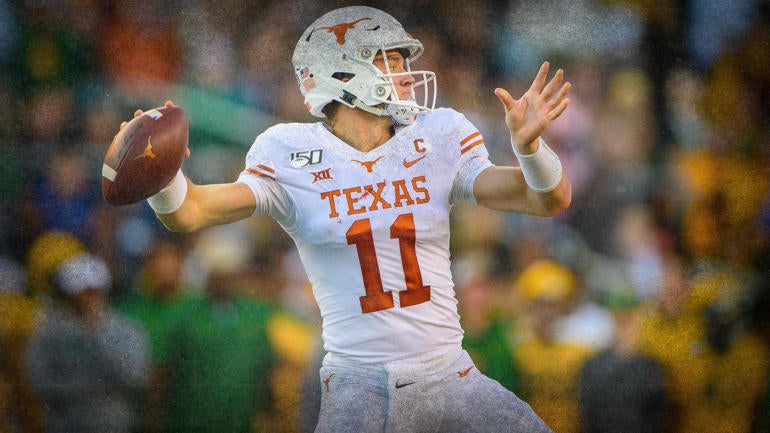
When it comes to analyzing quarterbacks at the college level, anyone who has reached the status of being a Power Five starter is clearly a very accomplished and talented player. But these days, national championship contention involves a razor-thin margin for error and requires the ability to reach an elevated level of play reserved for the sport's elite. Long-time listeners of the Cover 3 Podcast know the conversation well, but when Barton Simmons, Tom Fornelli and I are breaking down quarterbacks for the best teams in college football, you'll often hear the terms "maverick" and "bus driver" as a sorting tool.
Bus drivers get you to where you need to go on time. They are capable of leading a team to title contention and even winning a national championship ... with the right pieces around them. But when judged individually, as players are in the NFL Draft process, they are not rated against their peers the way their teams were in college.
Mavericks, on the other hand, are elite. When they are judged against their peers, they are proven to be among the most talented quarterbacks in the entire country. To put an oversimplified line in the sand for this discussion: mavericks are first or second round NFL Draft talents while bus drivers often are Day 3 picks or go undrafted.
Of the 15 starting quarterbacks for the 16 national champions of the BCS era, only five were first-round picks in the NFL Draft. With the exception of Matt Leinart, Vince Young, Tim Tebow, Cam Newton and Jameis Winston, every other national championship-winning quarterback between 1998 and 2013 was drafted in the fourth round or later, if they were drafted at all. It was an era where you could win a national championship with a bus driver as long as you had enough first round NFL talent elsewhere on the field.
Want more college football in your life? Listen below and subscribe to the Cover 3 College Football podcast for top-notch insight and analysis beyond the gridiron.
But two things have changed in the College Football Playoff era. First is the emphasis on elite quarterback play, which is a continuation of a trend that began before 2014 and extends to all levels of the sport. From hurry-up offenses to the read-pass option, the fate of a team is put in the hands of the quarterback more than ever and the need for elite quarterback play has only increased in the investment in getting these signal-callers to a more advanced level of play at earlier stages of their career. Coaches have also realized the importance of elite quarterback play and focused their recruiting in that direction. Whether it's on National Signing Day or through the transfer portal, the best teams in the country are landing the most highly-developed and high-ceiling quarterbacks in the country.
"When you think about the way the game has changed of late to being so quarterback-focused, it's so critical to have the top quarterback," Simmons said. "Because the top quarterback is usually finding his way onto the best teams in college football. So you can't really win the national championship with a bus driver anymore."
The second change is the format of the national championship itself. One good game against one of the two best teams in the entire country could be enough for a quarterback to win it all. Ken Dorsey, Criag Krenzel, Chris Leak, Matt Flynn and AJ McCarron all won BCS National Championship Game MVP honors, but none of them went higher than the fifth round in the NFL Draft. Now it's two games against two of the best teams in the country, with even less of an opportunity to catch an opponent off-guard after throwing your best punch in the semifinals to even reach the game's biggest stage. By the time both teams reach the College Football Playoff National Championship Game there are no secrets and no surprises. The teams that win it all, according to our small sample size, are the ones that have elite talent at the quarterback position.
NOTE: We're going to grade to assign NFL Draft projections to the three quarterbacks with playoff experience still in college. Trevor Lawrence and Justin Fields, as projected by many, are going to be considered first-round talents and Ian Book -- though his draft future can change with his play in 2020 -- gets a fourth-round grade.
Of the 19 quarterbacks that have started in a College Football Playoff game, 10 of them have been first- or second-round talents. Those 10 quarterbacks have combined for 13 playoff wins and four of the six national championships, including every title since 2016. The other nine quarterbacks have combined for just five playoff wins, four of them coming from Ohio State and Alabama in championship runs. Without Cardale Jones' two wins in 2014 and Jacob Coker's two in 2015, the playoff record of quarterbacks outside of that first two-round NFL Draft group is 1-7. So if you're not Alabama or Ohio State, the odds of winning the national championship should you make the College Football Playoff are long if you don't a maverick at quarterback.
But as we spin this forward and look ahead to 2020, there is a twist worth mentioning: Burrow's leap from bus driver to maverick in 2019. He's the reason that fans are willing to keep those national championship hopes alive even if they accept the current talent grade of their favorite team's quarterback.
"Joe Burrow has created a world in which anything is possible," Simmons said. "Burrow made the leap from average quarterback who was predicted to be a sixth-round pick to the best college quarterback we've ever seen. So yeah, it's possible [for a quarterback to play his way into the first or second round]."
Earlier this week, colleague Ben Kercheval put together a thorough breakdown of the top 50-plus quarterbacks by tiers. With the ceiling-setting impact of pro prospects in mind, we'll work the other way by tiering the teams based on their quarterbacks.
Below we've set the top 16 teams on the William Hill Sportsbook national championship odds board into three categories. The teams that already have a first- or second-round talent at quarterback, the teams that have a set starter who could become a first- or second-round talent with a solid 2020 (and thus improve their team's chances of winning the national championship) and a third group of team with uncertainty at the quarterback position.
Teams with a maverick
- Clemson (11/5): Trevor Lawrence
- Ohio State (4-1): Justin Fields
- Georgia (7-1): Jamie Newman
- Texas (35-1): Sam Ehlinger
- USC (60-1): Kedon Slovis
There's no real need to elaborate on Lawrence and Fields. They've each proven their elite status on the field and both begin the year at the center of the national championship discussion. CBS Sports NFL Draft expert Ryan Wilson projects Newman joining Lawrence and Fields as a top-10 pick in 2021, noting that the move to Georgia has the former Wake Forest quarterback on "everyone's first-round radar."
Ehlinger doesn't need a leap to be a second-round pick in 2021, but if he does take a step forward then Texas' chances of making the College Football Playoff for the first time greatly improve. He's closer to a second-round talent than a lock to hear his name on the first night of the draft, but Ehlinger's productivity is off the charts and he carries enough responsibility within the offense to be considered one of the most valuable players in the country to his team's success.
And while we still have at least two full seasons before Slovis is eligible for the draft, he's already exceeded the expectations set by his three-star rating coming out of high school. The Pac-12 Offensive Freshman of the Year racked up 30 touchdowns and just nine interceptions with 3,502 yards on 71.9% passing. Even if USC falls short of team expectations, I think Slovis remains a first- or second-round talent in an offense that promises to be productive with Graham Harrell in Year 2 as offensive coordinator and a wide receiver room loaded with talent.
Looking for a Burrow-like leap
- Florida (15-1): Kyle Trask
- Auburn (25-1): Bo Nix
- Notre Dame (28-1): Ian Book
- Penn State (30-1): Sean Clifford
- Texas A&M (30-1): Kellen Mond
- Miami (60-1): D'Eriq King
I think the players with best chance to jump into the first- or second-round conversation from this group are the teams with the longest title odds. Both Mond and King are playing for their professional futures in 2020, and while production and strong play can get them up into the mix for the top 64 picks in the draft, there's a handful of other places on both teams' depth charts where big leaps need to be made in order for them to be in the mix for the College Football Playoff.
Trask had a great season in 2019 and there's no question the Gators are entering the fall in a position to displace Georgia from atop the SEC East and therefore are on the short list for national championship contention. At the moment, however, he's rates closer to a bus driver than a maverick and needs to take a step in his second season as starter to reach the level seen by the most successful quarterbacks of the playoff era.
Book's already proven himself to be a playoff-caliber quarterback, but the distance between good and great was evident in a head-to-head matchup against Trevor Lawrence in the 2018 Cotton Bowl semifinal. If he takes a Burrow-like leap, then Notre Dame can contend for a national championship, but as is the Irish remain a high-floor option outside the inner circle of contenders.
QB ceiling is TBD
- Alabama (9/2): Mac Jones/Bryce Young
- Oklahoma (20-1): Spencer Rattler
- LSU (25-1): Myles Brennan
- Oregon (25-1): Anthony Brown or Tyler Shough
- Michigan (40-1): Joe Milton or Dylan McCaffrey
Alabama and Oklahoma have a combined nine playoff appearances so the stakes are much higher for a pair of Power Five conference favorites looking to make it back to the College Football Playoff in 2020. With a five-star rating coming out of high school, both redshirt freshman Spencer Rattler and true freshman Bryce Young carry first round NFL Draft projections from talent evaluators. But until they show it on the field, their ability to take those teams over the top is yet be determined. If the Tide are rolling with Mac Jones, it'd probably require a leap for him to be considered a first- or second-round talent.
That said, Alabama is one of our two examples of an undrafted quarterback leading the team to the highest peaks in the sport. And Alabama's offense is loaded. We saw Najee Harris, Alex Leatherwood and DeVonta Smith all turn down an opportunity to play in the NFL in 2020. Throw in Jaylen Waddle and it's possible Jones is leading an offense with four first-round picks in the 2021 NFL Draft.
Ed Orgeron made it clear earlier this spring he doesn't expect Brennan to be Burrow, so there shouldn't be an expectation that he will make a similarly explosive leap in a single season. The unknowns around the quarterback battles at Oregon and Michigan will make them two of the biggest preseason spotlights when camps open. For the Ducks in particular, the battle carries significance for a program that's knocking on the door of a return to the College Football Playoff after winning the Pac-12 and a Rose Bowl in 2019.








